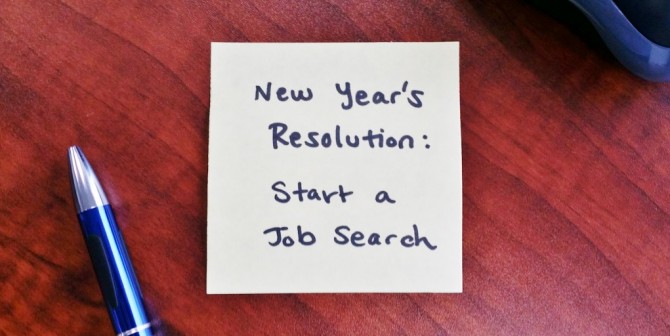New Year, New Job?

As we usher in the New Year we also welcome the age old tradition of wiping the slate clean and resolving to do things better than the year before. With many people this may be giving up smoking, reigning in the drinking or changing their diet, whilst others begin to evaluate more defining changes that will make the year ahead more successful than the last. January is the busiest time for those who want to kick-start their careers, so if you find yourself amongst this group there are some useful tips and information below:
Be Realistic – job hunting takes time, but it also takes common sense. Take time to think about why you want to leave your current job: if it is the company culture then look at businesses you aspire to work for; if it is the industry then consider aspects you enjoy, recognise your key skills and experiences and identify any courses or training you need to enter a new profession.
Alter Your Lifestyle – whilst you are searching for a new job, whether in the same industry or an entirely new one, it is important to recognise this not only takes time, but money. How will you pay for the industry recognised course or absorb the loss of bonus during the transition from one job to the next? Be prepared to reign in the spending for a few months or dip into your savings to support yourself.
Perfect Your CV – this is your sales document, the most critical resource you have when applying for new roles. It is the first impression a Recruiter has of you and it takes just 10 seconds for them to judge. A cohesive layout and font size, simple formatting, correct spelling and good grammar is everything. Of course, you have to ensure the document is pertinent, selling your relevant skills and experience to show a new employer what you can offer their organisation. Use concrete examples to back up points: ‘financially astute’ – how? Did you manage and set budgets? What was the value? Facts, figures and statistics make your CV stand out. As a final note, we recommend keeping it to two pages.
Prepare – preparation is the difference between a great interview and an embarrassment. Ensure you have researched the company, understand the role and can confidently list experience and skills that make you the right candidate. Anticipate competency based questions you might be asked, such as your strengths and weaknesses, what you can bring to the role and what interests you about the position. I can’t stress how important it is at this point to talk about why you want to join the business and think you are suited for the role, rather than why you hate your current job and dislike your boss. Refer back to the job description and identify relevant experience that fulfils the role.
Resilience – nothing ever comes easy and knock backs can come thick and fast. There may be a lack of jobs in your chosen sector, you may be applying for ten a day and hearing nothing back, or you may be attending first stage interviews and never getting any further. Why is this happening? In desperation it is easy to apply for anything and everything, but remember that a Hiring Manager who keeps seeing your name pop up will question your commitment to their organisation or your desperation to leave your own. Similarly, think back over an interview and try to pinpoint what did not go to plan – was there a specific question you could not answer, and were you fully prepared for the meeting?
First impressions count – clean suit, clean appearance, clean shoes. At this stage you have limited information about company culture and office environment. Rather than assume it is smart-casual and turn up looking like you have come straight from the cinema, show your potential employer you have made an effort and this opportunity matters.
Network – if you have the resources and the connections, network with relevant individuals in the industry and learn more about their organisations and team structure. Ask those you trust to keep their ears to the ground and give you a heads up when new opportunities open up. Social networking is equally if not more important, and your social profiles are a goldmine for prospective employers. If you use Facebook and Twitter to share pictures of holidays and nights out then ensure your privacy settings are as strict as they can be. LinkedIn is the ideal network for professionals: connect with colleagues, clients and acquaintances; receive endorsements and recommendations; and expand on some of the points you had to streamline in your CV. Use it correctly and social media will be your biggest ally.
Although New Year feels like the traditional starting point to make changes in your life, you can make these changes at any time. Finding the right job rather than any job is crucial, so take time to evaluate everything from culture, commute, work/life balance, progression, training and remuneration, and make sure you find a role that compliments your experience and fuels your ambition. The January Blues get the best of us and the first week back is challenging, so be clear whether you genuinely want a new job or just miss the comfort of your sofa and picking on chocolates and crisps. If you do need career guidance, CV advice or interview coaching, Foundation Recruitment’s dedicated team of Consultants are trained to ensure we find the best match for both candidate and client and form an effective and long-lasting partnership. Visit our website for more information, to browse our vacancies or to register your CV.
Shaunagh Durkin, Consultant, Foundation Recruitment
